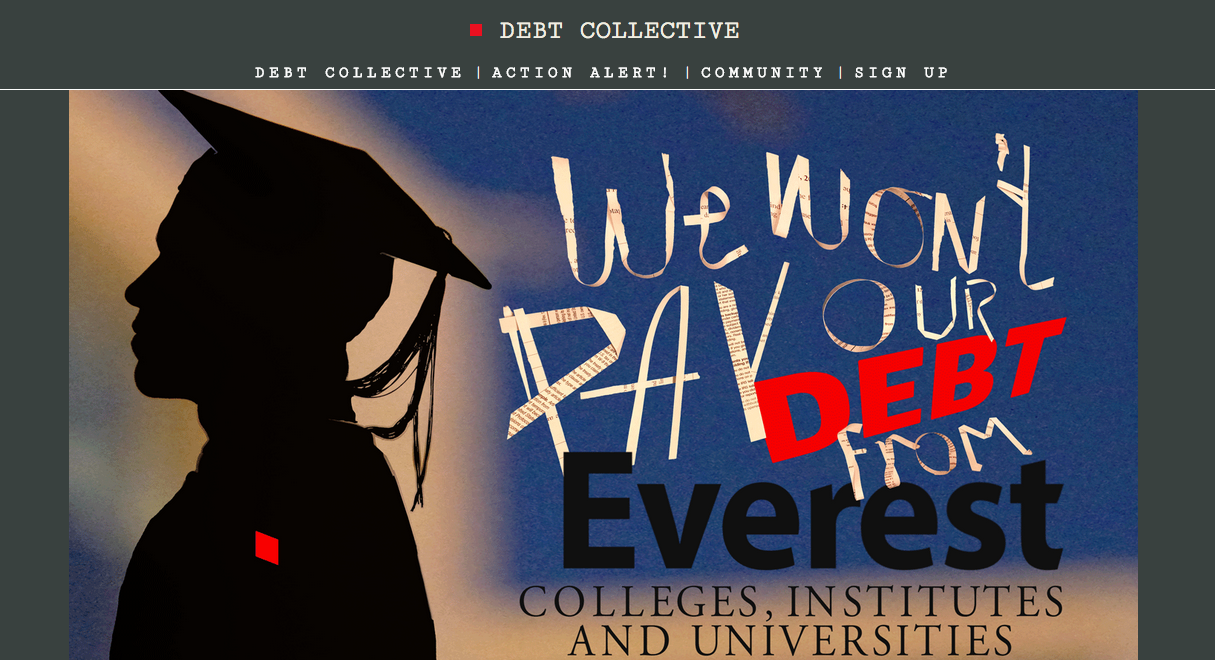Current, Former Corinthian College Students Go On “Debt Strike,” Refuse To Pay Private & Federal Loans
With for-profit educator Corinthian Colleges Inc. selling off campuses and closing schools, thousands of Everest, WyoTech, and Heald College students are waiting to learn the fate of the more than $1 billion in private and federal student loan debt used to finance their education. While the Department of Education and the Consumer Financial Protection Bureau have worked to secure deals in which some of that debt will be forgiven, some students are increasing the pressure on such deals by staging a “debt strike.”
Insider Higher Ed reports that 15 current and former CCI students, who call themselves the Debt Collective, are refusing to pay their federal student loans in protest of the government’s support of the for-profit college company.
The group – which is an off-shoot of the Rolling Jubilee group that has bought and paid off some CCI students’ debts – says they are calling on the federal government to wipe away the loans of Corinthian borrowers who were pressured by the school to enter into a “debt trap.”
In a letter to the Dept. of Education last week, the Debt Collective members say they “paid dearly for degrees that have led to unemployment or to jobs that don’t pay a living wage.”
“We can’t and won’t pay any longer,” the group says.
Jessica, a Debt Collective member, tells Inside Higher Ed that she enrolled in Everest’s medical assistant certificate program in 2012, but dropped out eight moths later when she was unable to afford the $50 monthly payment that came with the private loans she received from CCI.
“I feel like these loans are so illegitimate,” she says of the $25,000 in private and $6,000 in federal loans she took out to attend Everest. “I was conned going into this school. They sold me a dream and I got a nightmare.”
While it is still unclear exactly how many of the students affected by the sale or closure of CCI campuses will fare when it comes to their student loan debt, an operating agreement [PDF] hashed out between the college chain and the Dept. of Education over the summer described a few potential options for students with federal loans.
If a student attends a school slated for closure, or if that student withdrew within 120 days of the school closing, they may be entitled to a closed school discharge. This means that the student would have no further obligation to repay their Direct Loans, Federal Family Education Loan (FFEL) Program loans (which include Stafford and PLUS loans), or Perkins Loans.
In some cases, students could be eligible for a “teach-out” program in which they are able to complete their degrees at their current school or at a comparable institution. Under this option, students would still be responsible for repaying their loans.
Although students who attend CCI schools that have been put up for sale have very few options when it comes to refunds or discharges, the Dept. of Education and the CFPB are working to ensure they are taken care of.
Such was the case for students of 56 CCI campuses recently sold to Education Credit Management Corporation. As a condition of the sale, the Department and CFPB announced it had secured $480 million in debt relief for students who took out CCI-brokered private Genesis Loans.
Aside from the agreements with CCI and ECMC, the federal government offers several income-based repayment programs that aim to make loan payments less burdensome for low-income students.
Income-driven plans like Pay As You Earn and others are designed to prevent borrowers from defaulting on their loans, a problem faced by about 20% of people repaying college debt.
However, members of the Debt Collective tell the Department in a letter that such program “simply aren’t good enough.”
Jessica tells Inside Higher Ed that on principle she doesn’t want to repay her loans, which are already in default.
“I’ve refused to pay because I didn’t get anything for this money, so I don’t see why I should have to give them anything,” she says.
Debt Collective isn’t alone in their fight to have student loans discharged. Back in December, a group of 13 senators asked the Dept. of Education to consider giving CCI students a way out of their loans.
The senators asked the Dept. in a letter [PDF] to utilize its authority provided under law to “immediately discharge federal student loans incurred by borrowers who have claims against Corinthian.”
Inside Higher Ed reports that a spokesperson for the Dept. said the agency is still working on a response to the senator’s letter, but it shares “the same commitment… to upholding the rights of students who may have been harmed by the actions of institutions that participate in federal student aid programs.”
In addition to promoting the Debt Collective’s strike, Rolling Jubilee also announced this week that it had purchased additional private student loan debt from CCI students. The group claims to have now erased more than $13 million in loans for 9,438 borrowers.
Corinthian ‘Debt Strike’ [Inside Higher Ed]
Want more consumer news? Visit our parent organization, Consumer Reports, for the latest on scams, recalls, and other consumer issues.


